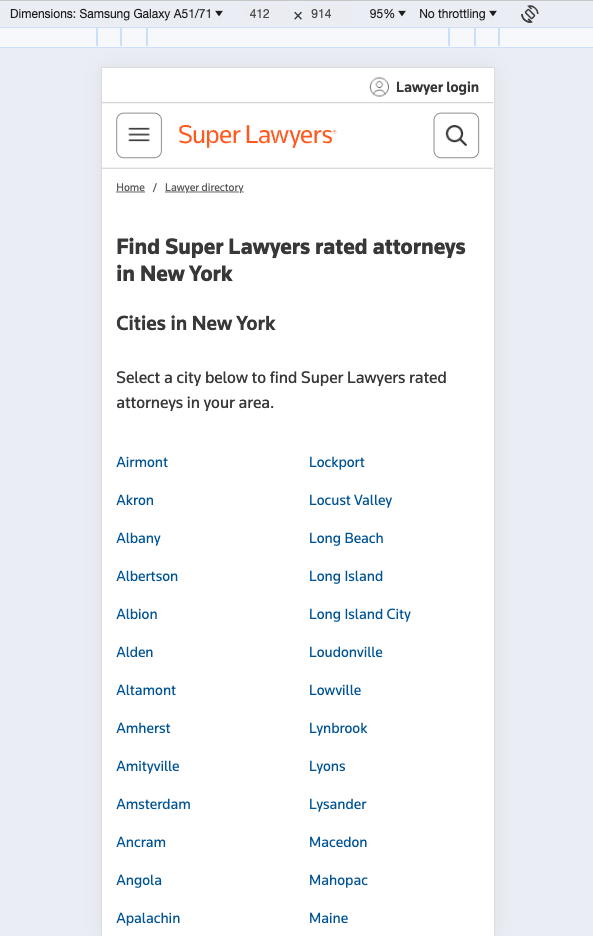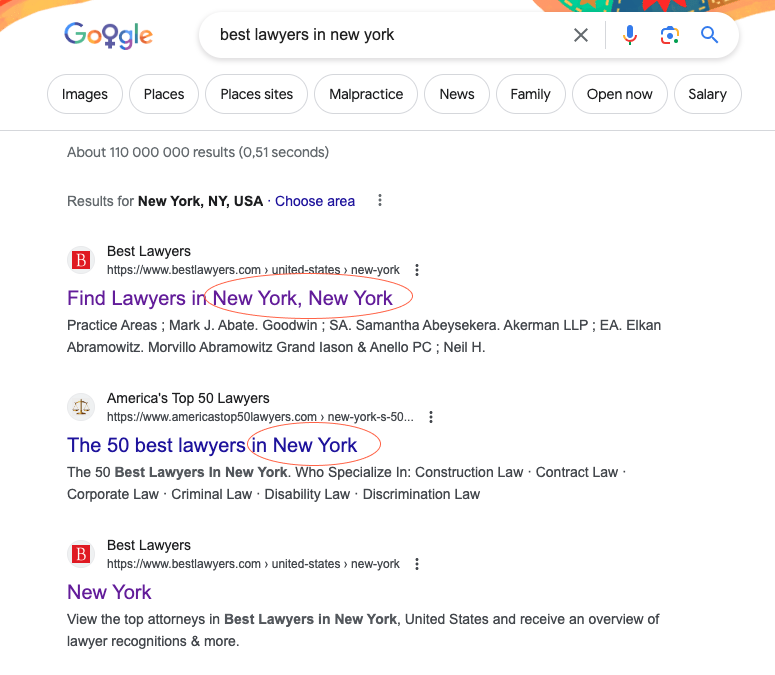
Understanding Location Pages and Their Importance in SEO
In today's fast-paced digital marketing landscape, location pages have become increasingly important. But what exactly are they? In simple terms, location pages are webpages that focus on providing specific information about your business in a particular area.
Why Location Pages Matter for SEO
Location pages play a crucial role in SEO for two main reasons:
- Enhancing Search Relevance: Search engines like Google rely on location data to deliver relevant search results to users. For instance, if you own a pizza restaurant in Brooklyn and someone in the area searches for "Pizza near me," having a well-optimized location page can improve the chances of your business appearing in those search results.
- Improving User Experience: Location pages can also greatly enhance the overall user experience on your website. Imagine a potential customer landing on your webpage seeking your store's address or contact details. A well-designed location page can seamlessly provide this information, ensuring visitors remain satisfied and reducing bounce rates.
Benefits of Using Location Pages for SEO
Integrating location pages into your SEO strategy can bring several advantages, whether you're a small local business or a larger enterprise with multiple locations:
- Increased visibility in local search results
- More targeted traffic directed to your website
- Improved user experience by offering relevant information
- Enhanced engagement with location-specific calls-to-action
- Higher conversions from local customers
To put it simply, incorporating location pages into your SEO efforts can be a game-changer for your business!
Components of an Effective Location Page
An extraordinary location page is like a virtual storefront, inviting users in with its appeal and convincing them to stay with its valuable content. But what exactly makes up a successful location page?
- Location Details such as Name, Address, Phone Number (NAP). Your NAP details should be accurate and consistent across all your web pages. They are a primary source of information for both customers and search engines.
- Product/Service Offerings. A clear description of your products or services helps users understand what you do. It also gives search engines more context about your business.
- Business Hours. Your business hours let customers know when they can reach you or visit your physical location. Make sure this information is always current to avoid any confusion.
- Reviews and Testimonials. Featuring reviews and testimonials on your location page builds trust and credibility. They serve as social proof that other customers have had positive experiences with your business.
- Directions to the Business Location. Including clear directions to your business location provides convenience for customers planning to visit. Interactive maps can be very useful here.
- Images of the Business. Images make a significant impact on user experience. They add visual appeal and can give potential customers a feel for your business environment before they even step through the door!
- Calls to Action (CTAs). Finally, compelling CTAs guide your website visitors on what to do next, whether that's booking an appointment, making a purchase, or calling for more information.
Crafting an effective location page involves integrating these essential components in a user-friendly manner.
Optimizing Location Pages for SEO
Optimizing location pages for SEO isn't just about adding a few keywords and hoping for the best. It involves several key components. Let's dive in!
1. Mobile-Friendly Websites: A Must-Have

In this digital age, the importance of mobile-friendly websites cannot be stressed enough. With the majority of internet users accessing websites through their mobile devices, Google has implemented a mobile-first indexing policy. This means that if your website isn't optimized for mobile usage, it could significantly hamper your SEO performance and subsequently, your site's visibility on search engine results pages.
2. Location-Specific Keywords

Location-specific keywords are your ace in the hole for local SEO. By seamlessly incorporating these keywords into your content, meta tags, and URL path, you can dramatically improve your visibility in local search results. However, be careful not to overuse these keywords as it can lead to penalties and damage your SEO efforts, resulting in massive loss of traffic.
3. Unique Content: Avoiding Duplicate Content Issues

Duplicate content is harmful to any SEO strategy. To avoid this problem, each of your location pages should feature unique and locale-specific content. This not only helps avoid potential penalties but also provides valuable information relevant to each specific location.
4. Business Hours and GMB Listing: Small Details That Matter
Even small details like displaying business hours on your location page or having an optimized Google My Business (GMB) listing can have a significant impact on potential customers and therefore on your local search rankings.
5. Customer Reviews and Testimonials: The Voice of Your Customers
Customer reviews and testimonials are powerful tools in building trust with potential customers and improving your SEO efforts by providing fresh, user-generated content that search engines prefer.
6. Schema Markup: Helping Search Engines Understand Your Content

Schema markup is a valuable tool that gives search engines additional information about your content. Adding schema markup for elements such as address, contact number, operating hours, or even customer reviews can improve your search results presentation and potentially boost your rankings.
7. Internal and External Links: Navigational Aids That Also Boost SEO
Lastly, it's important to include relevant external and internal links in your location pages. These links serve as navigational aids that improve user experience and enhance SEO by revealing the structure and depth of your website to search engines. Each link should serve a purpose and add value to your content.
Location Pages for Single-Location Businesses vs. Multi-Location Businesses
Let's talk about the benefits of location pages for two types of businesses: single-location businesses and multi-location businesses. Each has its own unique considerations and strategies.
Single-Location Businesses
For single-location businesses, every detail on your location page can help attract potential customers. The goal is to create an authentic local presence online that reflects your physical store.
Here are some tips for single-location businesses:
- Highlight Local Features: Showcase local landmarks, events, or culture in your content to emphasize your connection to the community.
- Partner with Local Businesses: Collaborate with other local businesses to promote each other. This increases your visibility and creates a sense of community.
- Ensure Consistent NAP Data: Make sure your Name, Address, and Phone number (NAP) are correct on all platforms. Inconsistencies can confuse search engines and potential customers.
Multi-Location Businesses
For multi-location businesses, location pages become even more important. They act as individual mini-websites that represent each store's unique identity while improving overall online visibility.
Here are some tips for multi-location businesses:
- Have Separate Pages for Each Location: Create different location pages for each branch. This helps search engines understand and rank each page separately, which improves localized search results.
- Tailor Content to Each Location: Adjust your content to fit each specific location. Talk about local events, culture, or landmarks that are relevant to that particular store.
- Use a Central System to Manage NAP Data: Utilize a centralized system to manage NAP data across all locations to ensure consistency.
Regardless of the number of locations, one important strategy is building domain authority for local organic search results. This involves getting links from respected websites, providing high-quality content, and being active on social media.
Ranking Factors for Local Pack and Local Organic Search Results
Ranking Factors for Local Pack
The first thing to know about ranking in the Local Pack is that Google really loves consistency. From your NAP (Name, Address, Phone number) data to your business hours across all platforms, uniformity is important.
- Consistency: Ensure your NAP data and business hours are consistent across all platforms.
- Proximity: The closer your business is to the searcher's location, the higher your chances of appearing in their Local Pack.
- Relevancy: Make sure your business category matches what people are searching for in your area.
Ranking Factors for Local Organic Search Results
Now, let's talk about Local Organic Search Results. Here too, consistency matters, but the focus shifts more towards your website's overall SEO strength.
- Consistency: Maintain consistency in your NAP data and business hours.
- Content Quality: Your website's content quality plays a significant role here. Informative and engaging content that includes local keywords can help improve your rankings.
- Backlinks: Backlinks from respected websites signal Google that your site is trustworthy and relevant.
- Online Reviews: Online reviews also play a part in this ranking dance. More positive reviews can give you an advantage over competitors.
Whether you're trying to rank in the Local Pack or improve your standing in Local Organic Search Results, these factors can make all the difference.
The Impact of Location Pages on SEO and Website Metrics
Enhancing Site Quality and User Experience
Put yourself in the shoes of a user, browsing through a site with accurate and detailed location pages. The ease of finding relevant local information improves the site's quality score. This is because search engines like websites that provide value to their users, which greatly affects your SEO efforts.
When it comes to user experience, think about how frustrating it is when you can't find the information you need. A well-designed location page solves this problem by giving you all the necessary details, such as business hours, services offered, and directions. All this information is conveniently available in one place, making it easy for you to find what you're looking for.
Boosting Local Search Performance
Location pages are not just placeholders; they're performance enhancers.
Effective location pages have a significant impact on local search performance. Simply put, the better your location pages, the higher your chances of being found by local customers. They act like a beacon, guiding local searchers straight to your doorstep.
The Power of Consistent NAP Data
Let's not forget about the importance of NAP data—Name, Address, and Phone number. Having consistent NAP data across all channels builds trust with search engines. The more trust you have, the better your local search ranking. It's like being vouched for by the 'digital bigwigs'.
So, let's face it: neglecting your location pages might just be leaving money on the table. They're an essential tool in your SEO toolbox, ready to boost website metrics and drive your online success.
Local SEO with Location Pages: Case Studies and Testimonials
In the world of Local SEO, nothing proves credibility like case studies and testimonials. These real-life stories are powerful tools to highlight your business value, attracting potential customers to explore what you offer.
The Power of Case Studies
Case studies are success stories that explain how your products or services have helped other customers. They go beyond self-praise; instead, they demonstrate your expertise in solving real problems.
For instance, if you own a plumbing service, a case study could describe how you saved a local restaurant from a disastrous leak during busy hours. This true story becomes an authoritative piece of content that not only improves your SEO but also builds trust in potential customers.
The Importance of Testimonials
On the other hand, testimonials are personal recommendations from satisfied customers. They provide social proof that your business delivers on its promises. Search engines love them too! Well-placed testimonials on your location pages can improve their relevance and authenticity, directly contributing to SEO optimization.
"I couldn't be happier with the grooming services at XYZ Pet Salon! Their staff is friendly, their facilities are clean, and most importantly, my dog always looks amazing after a visit." - Jane Smith
Consider this: A location page for your pet grooming salon is filled with glowing testimonials from happy pet owners praising your services. This will not only increase your page ranking but also make future clients feel more comfortable trusting their furry friends to you.
The Impact of Online Reviews
Now let's discuss online reviews, particularly Google reviews. Reviews on Google are highly visible and can influence how Google ranks your business in local search results. Positive reviews indicate to Google that your business is trusted, while the quantity of reviews can affect where you rank compared to competitors.
Tools for Local SEO Optimization
Lastly, consider using tools like Local Search Fuel by Hurrdat for customized solutions. This tool helps businesses optimize their location pages for better visibility and ranking in local search results.
Remember, every customer interaction has the potential to become a compelling case study or shining testimonial. Make sure you're capturing these valuable opportunities to enhance your local SEO with location pages.
Conclusion
Using location pages is no longer a choice but an important factor for SEO success. They're not just online business cards; they are powerful tools that improve online visibility, bring in visitors and increase sales.
How to Maximize the Potential of Your Location Pages
To make the most out of your location pages, here are some key steps you can take:
- Boost your online presence by including important location information - name, address, phone number (NAP).
- Optimize your page with location-specific words to match popular local search questions.
- Harness customer reviews and testimonials to build trust and increase ranking.
- Incorporate internal and external links strategically to boost engagement and ranking. AI-powered SEO tools can be instrumental in this regard.
Whether you have one or many locations, carefully crafted location pages can push you into the spotlight of local organic search results. They greatly impact website measures like site quality and user experience while improving local search performance.
Remember, SEO isn't the same for everyone. It needs a focused, personalized plan. And in this situation, location pages are your secret weapon to succeed in local SEO. Use them wisely!
